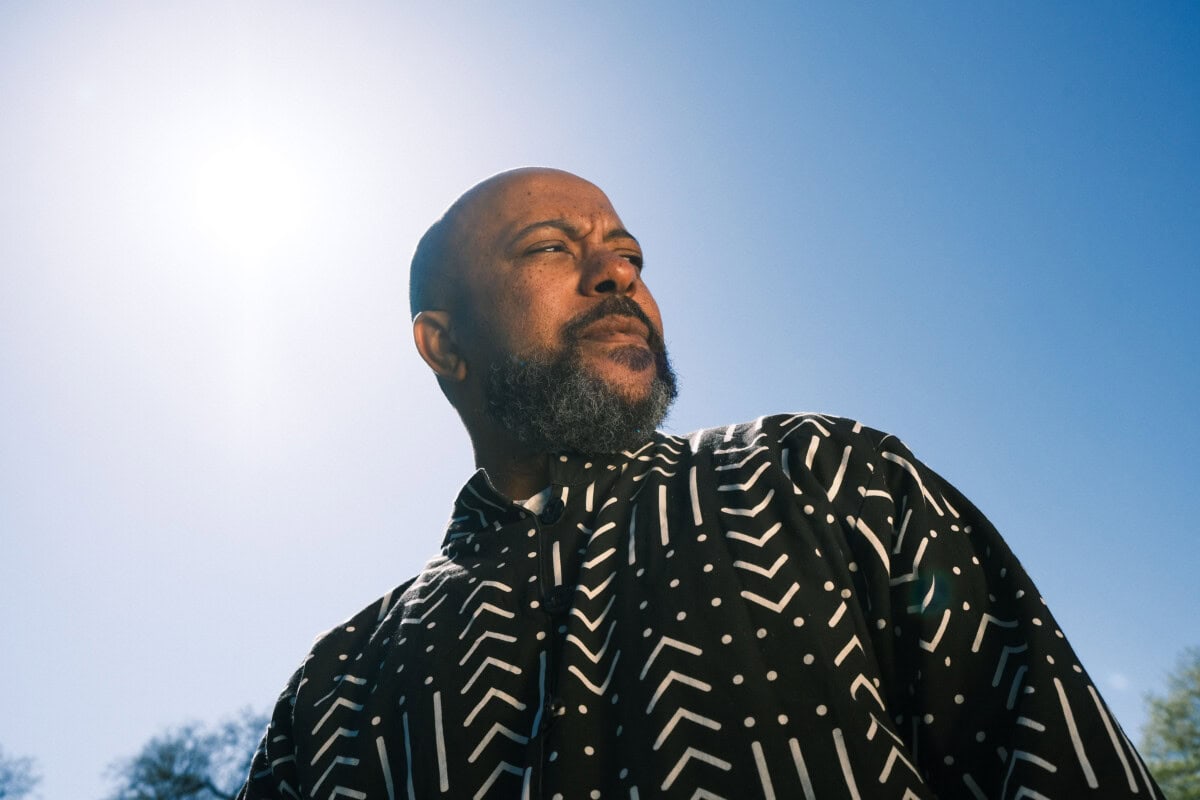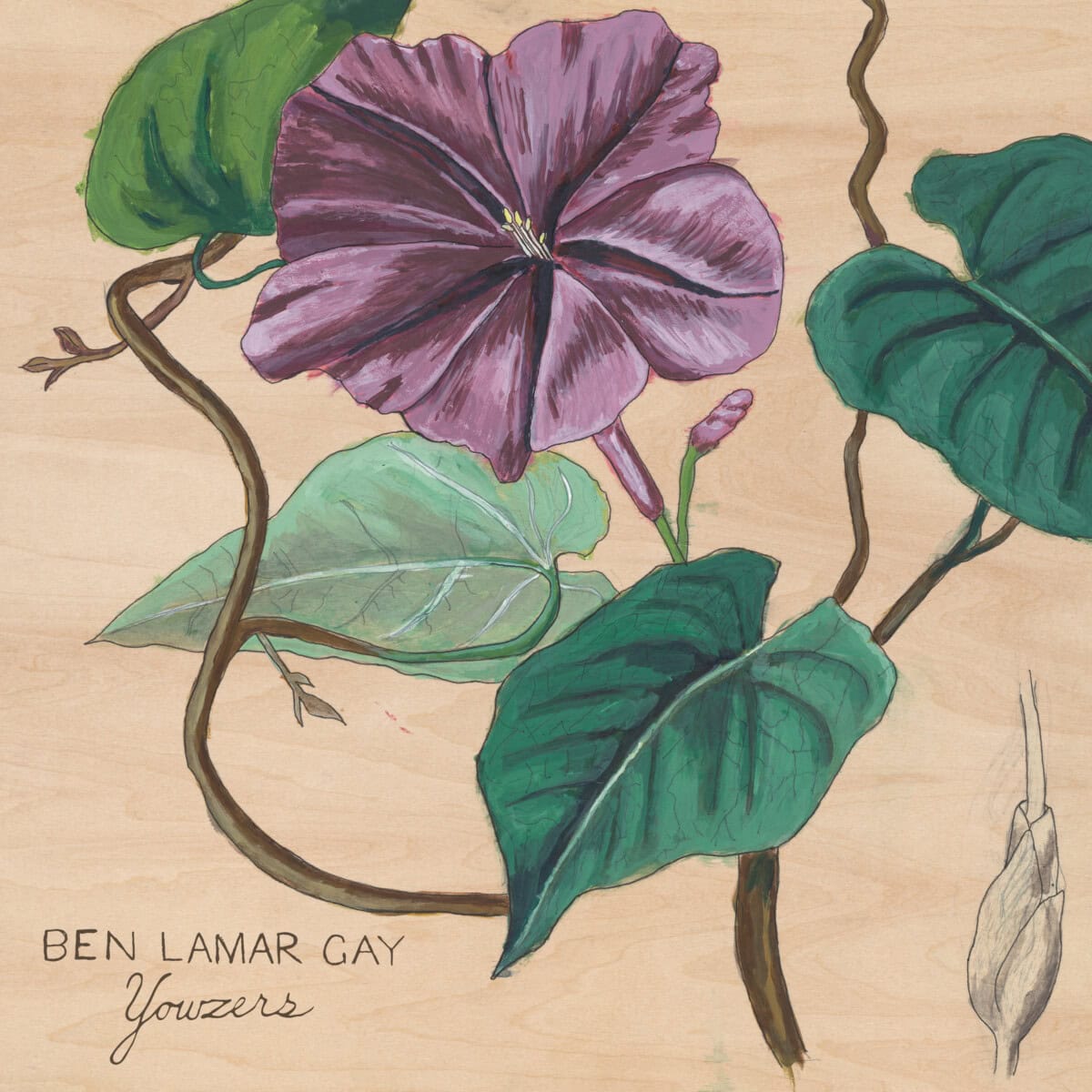
Ben LaMar Gay retells an American myth on “John, John Henry”
TRACKLIST
yowzers
the glorification of small victories
there, inside the morning glory
roller skates
for Breezy
I am (bells)
promontory
John, John Henry
damn you cute
cumulus
touch
leave some for you
CREDITS
All songs composed by Ben LaMar Gay.
featuring:
Ben LaMar Gay – cornet, voice, synth, bells, diddley bow, percussion, programming, manipulations
Tommaso Moretti – drums, percussion, voice
Matthew Davis – tuba, piano, bells, voice
Will Faber – guitar, ngoni, bells, voice
also featuring:
Rob Frye – flute, bass clarinet
Ayanna Woods – voice
Tramaine Parker – voice
Ugochi Nwaogwugwu- voice
Tracks 2, 3, 6, 10, and 11 recorded live at Palisade Studios, Chicago, December 4th-5th, 2023
All other tracks recorded at International Anthem Studios, Chicago, July-December, 2024.
Produced by Ben LaMar Gay
Recorded and Mixed by Dave Vettraino
Sequenced by Scott McNiece
Mastered by David Allen
Artwork by A.Martinez
Layout & Design by Aaron Lowell Denton
Today, Ben LaMar Gay — the Chicago composer, improviser, instrumentalist, and musical folklorist — shares “John, John Henry,” his singular interpretation of an American myth and the latest offering from Gay’s new album Yowzers, out June 6th via International Anthem. Listen to “John, John Henry” and preorder Yowzers here.
“The Ballad Of John Henry” — the song about a freedman working as a steel driver — boasts a rich tradition of interpretation, performed by everyone from Lead Belly and Dave Van Ronk on through to Songs: Ohia and Rhiannon Giddens.
Even among that varied crowd, Ben LaMar Gay’s “John, John Henry” is an outlier. It begins with doomy oscillations and click-clack electronic rhythm loops hovering atop a disjointed swing beat, before Gay and his choir (with singers Ayanna Woods, Tramaine Parker, and Ugochi Nwaogwugwu) enter in an exuberant chorus. But their joyful verve starkly contrasts the subject matter, as Gay’s lyrical embellishment on the dusty-yet-timeless tale of human versus machine has flipped it into a story about humans versus systemic violence. The singers get caught in an unexpected crossfire of bullets, but are protected by Gay’s version of the hero John Henry — a cousin who has “always held cold steel in hand,” and who knows his destiny is “the hammer will be the death of me.” The panicked singers cry “John Henry, the block is caving in!” to which the hero replies, “ain’t nothing but my hammer sucking wind.”
This type of fresh, pertinent, personalized reimagination is how Gay has managed to surprise consistently across his body of work. His ongoing exploration and expansion of folklore is perhaps the main thing that bridges all the disparate elements of his oeuvre.
Gay shares: “The intriguing thing about folklore is how it allows you to experience the depth of time, and the beauty of spreading information by word of mouth… The fact that only certain folk songs survive the test of time makes me wonder about the coded gems that live inside this information and the necessity of the eternal whisper in which it travels. I was young the first time I heard the name, “John Henry.” It was blasting from a cartoon on T.V. “JJJJohnnn Henryyyy!” echoed through the house and stayed. My experience with the legend up to now has been similar to playing telephone, the game where people form a circle to relay a quiet whisper of a message sent from another side of the circle. My version of the John Henry legend is me dealing with the moment when that eternal whisper finally finds my ear, inside the circle. “John, John Henry” can be heard as an extension of the perpetual theme “Man vs Machine” or “Man vs System.” One American moment. One American crossfire. It’s also an ode to the big cousin we all have who somehow believes in us and vows to protect us.”
In the growing tradition of Gay’s recorded output — including his 2018 greatest-hits-meets-debut album Downtown Castles Can Never Block the Sun and 2021’s critically-acclaimed Open Arms to Open Us, which have both become legendary for enveloping myriad sounds, stories, and dimensions of music into potent bodies of work — Yowzers is an utterly unique, joyfully irreverent psychedelic fantasia of folklore, free jazz, and avant-garde Blues.
At the heart of the album is Gay’s working quartet with Tommaso Moretti (drums, percussion, voice), Matthew Davis (tuba, piano, bells, voice), and Will Faber (guitar, ngoni, bells, voice). The group’s chemistry is palpable, cultivated over years of touring and performing together.
“A big part of the language this quartet has developed is spatial,” says Gay. “It’s seeing and hearing it live. You’re dealing with a thing that is older than the industry that sells it, and if you’ve never experienced those bodies in the room, there can be a disconnect.”
Striving to capture that raw, unfiltered energy on Yowzers, Gay tracked his quartet live at Palisade Studios in Chicago, with all four musicians sitting in a small circle, channeling and documenting their collective vibrations in real-time.
To expand the sonic spectrum of the album, Gay also composed and recorded a series of pieces in-studio at International Anthem HQ in Chicago. Working alongside engineer Dave Vettraino, Gay augmented his studio constructions with contributions from his bandmates, woodwind player Rob Frye, and a mini-choir comprising vocalists Ayanna Woods, Tramaine Parker, and Ugochi Nwaogwugwu.
About the album, Gay says: “Yowzers was a word and a sound that came to mind while observing the intersection of humor and horror in our present reality. On one side of a coin flip, Yowzers is a deep sigh that quietly exits the body after facing the absurd. On the other side, it is a cry of amazement at how many secrets were left behind to help us endure and transcend the absurdity.”
As a whole, Yowzers recalls the high-minded freedom of Liberation Music Orchestra, the abstract boom-bap balladry of Georgia Anne Muldrow, the unbridled rhythms and sandpaper bellows of Bukka White, the harmolodic cartoon glory of Arthur Blythe’s Illusions, or the oft-copped but rarely distilled patterns of Naná Vasconcelos. It’s a fresh thought made up of old ideas, filtered through an improvisational approach and a lifetime of stories and secrets embodied.
ABOUT BEN LAMAR GAY
Ben LaMar Gay is a genuine original. An imbued composer, conjurer, and channeler of cosmopolitan Blues, a patently eclectic polymath who Jeff Parker calls “hands down, one of my favorite musicians on the planet today,” Gay is a Southside Chicago native who was raised in the tutelage of the legendary AACM (Association for the Advancement of Creative Musicians). With his first instrument, the cornet, and an intuitive sense of self-production, in youth he traversed the diversity of the city’s music scenes (jazz, hip hop, house, electronic, rock, avant garde, salsa, latin jazz, et al) before embarking on a several-year residential relocation to Brazil. Beloved by listeners and collaborators alike for his ability to absorb and poetically refract the sound of any context he’s immersed in, Gay’s return home to Chicago in the early 2010s marked the beginning of a compositional output that has since been referred to by WIRE Magazine as “Pan-Americana.” As elusive as he is prolific, across seven under-the-radar years of work Gay diligently composed, produced and recorded seven collections of original music before compiling and issuing his unreleased ‘greatest hits’ as a debut album – Downtown Castles Can Never Block The Sun – for International Anthem in 2018. Also in 2018 Gay composed an original score for the Tribeca award-winning short doc The Good Fight. In 2019, he composed an original score for the Brazilian underground carnival profile This Is Bate Bola, and debuted new music commissioned by the Museum of Contemporary Art, Chicago. Despite his legendary elusiveness, he is a constant collaborator who has co-written works released by Makaya McCraven, Bottle Tree, The Notwist, and more. In 2017, he was an artist in residence at iconic Chicago architect Edgar Miller’s Glasner Studio, where he composed original music for the space. In 2018, he was a 3Arts / Stan Lipkin & Evelyn Appell Lipkin Awardee. In 2019, he composed and performed a duet with the DuSable Bridge while it was raised over the Chicago River. In 2020, he was an artist in residence for University of Chicago / Arts & Public Life’s Center for the Study of Race, Politics & Culture. For Time:Spans Festival 2021, at DiMenna Center for Classical Music in New York City, Gay debuted a new composition – “Known Better. Still Lit” – that was commissioned and performed by Wet Ink Ensemble. Gay’s latest album Open Arms to Open Us was released by International Anthem & Nonesuch Records in November 2021. In 2022 he released Certain Reveries, an album of duo compositions on International Anthem, and an accompanying film – “Balogun,” in tribute to the late Eddie Harris – which he staged, directed, filmed, and scored entirely himself. When he’s not on the road, he writes and creates from his studio within Theaster Gates’ Rebuild Foundation.
